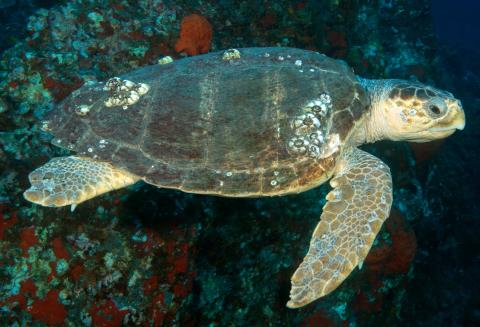Sea turtles were among the many marine species in the Gulf of Mexico that were significantly impacted by the Deepwater Horizon oil spill. All five species of sea turtles found in the Gulf experienced harm across all life stages impacting their populations for years after the spill.
One project recently wrapped up with the goal of better informing restoration activities to rebuild sea turtle populations. The project worked to identify factors contributing to sea turtle bycatch in the Gulf of Mexico reef fish bottom longline fishery, and was approved as part of the Deepwater Horizon Open Ocean Trustees’ second restoration plan.
Results of the project are now available, identifying several factors in the reef fish bottom longline fishery that may contribute to unintentional bycatch.
Project scientists analyzed observer data collected from 2006-2021 for a variety of factors that could contribute to sea turtle bycatch. This data shows that loggerhead sea turtles (Caretta caretta) are the primary species observed as bycatch in this fishery. The factors that may contribute to bycatch included gear components, fishing depth and time, number of hooks per line, and length of fishing time with gear. The project’s analysis also included environmental factors, such as sea surface temperature and lunar phase.
Overall, the project did not result in new next steps to immediately reduce sea turtle bycatch in the reef fish fishery, but the project did identify several areas where additional research or data collection would provide a better understanding of bycatch.
The analysis also confirmed previous research into the topic. Gear depth and season may play a more significant role in sea turtle interactions; summer months, particularly June, saw increased chance of sea turtle bycatch. Additional data on bait type and the length of time a longline is in the water could also help inform future restoration actions.
The full data analysis, methods, and results are available through the published Technical Memo on the NOAA Institutional Repository.
Additional Resources
- Project Page: Identifying Methods to Reduce Sea Turtle Bycatch in the Reef Fish Bottom Longline Fishery
We also send updates out via email. If you haven't already, please take the opportunity to sign up for email updates today to receive the latest news from all the Deepwater Horizon Trustees.


